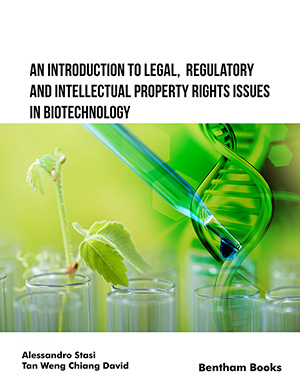Preface
Page: i-ii (2)
Author: Alessandro Stasi and Tan Weng Chiang David
DOI: 10.2174/9789815080629123010001
The History of Biotechnology and the Law
Page: 1-23 (23)
Author: Alessandro Stasi and Tan Weng Chiang David
DOI: 10.2174/9789815080629123010002
PDF Price: $15
Abstract
The chapter explores the historical development of a legal framework for
biotechnology regulation. It aims to provide an overview of the history of
biotechnological practices and the development of modern concepts. It describes how
people had used biotechnology processes for millennia, noting that the rise of modern
medicine can only be traced back to the 19th century, when the progress of science and
the advances in laboratory techniques contributed to the creation of a medical market.
The chapter ends by analyzing the origins of the U.S. Food and Drugs Administration
and the Food and Drugs Act of 1906.
The Regulatory Framework
Page: 24-39 (16)
Author: Alessandro Stasi and Tan Weng Chiang David
DOI: 10.2174/9789815080629123010003
PDF Price: $15
Abstract
This chapter draws upon the role and responsibilities of federal agencies in
regulating biotechnology products. It distinguishes the role of the Food and Drug
Administration (FDA), the U.S. Department of Agriculture (USDA), and the
Environmental Protection Agency (EPA) through statutory definitions. Special
emphasis is placed on defining the role of the Animal and Plant Health Inspection
Service (APHIS), the Agricultural Research Service (ARS), the Agricultural Marketing
Service (AMS), the Food Safety Inspection Service (FSIS), and the Foreign
Agricultural Service (FAS).
The Regulation of Human Genome Editing
Page: 40-59 (20)
Author: Alessandro Stasi and Tan Weng Chiang David
DOI: 10.2174/9789815080629123010004
PDF Price: $15
Abstract
With the progress of DNA sequencing technology and its falling costs, the
number of gene patents is dramatically growing. This chapter aims to shed light on the
regulation of human genome editing and its impact on health research. By analyzing
legal provisions and cases, this paper assesses whether genetically modified forms of
life meet the statutory requirements of utility, novelty, and non-obviousness under
patent law. The nature of the patentable subject matter of living organisms and genes in
the U.S. is also examined in detail.
Law and Emerging Genome Editing Technologies
Page: 60-86 (27)
Author: Alessandro Stasi and Tan Weng Chiang David
DOI: 10.2174/9789815080629123010005
PDF Price: $15
Abstract
It is strange that only extraordinary men make the discoveries, which later
appear so easy and simple.
This chapter outlines the historical development of genetic manipulation, assesses the
aspects that define genome editing technologies as breakthrough technologies and
examines the recent trends in patent litigation. It investigates the ownership and
licensing issues surrounding the revolutionary and highly lucrative CRISPR patents by
focusing on the recent development in patent battles.
Biotechnology, Property and The Human Body
Page: 87-110 (24)
Author: Alessandro Stasi and Tan Weng Chiang David
DOI: 10.2174/9789815080629123010006
PDF Price: $15
Abstract
The main objective of this chapter is to describe the development of legal
principles which are used to protect property rights in the human body and allow the
efficient use of human tissue, organs, DNA, and cell lines in medical research.
The Regulation of Genetically Engineered Plants and Animals
Page: 111-143 (33)
Author: Alessandro Stasi and Tan Weng Chiang David
DOI: 10.2174/9789815080629123010007
PDF Price: $15
Abstract
The recent advances in genetic engineering have enabled the development of
new approaches to animal husbandry and agricultural production. Researchers have
developed genetically modified laboratory animals to enhance specific characteristics
and increase the efficiency of food production. At the same time, new and distinct
varieties of plants have been produced with biotechnology. This chapter aims to
investigate the legal issues that arise from the use of genetic engineering techniques in
plants and animals.
Subject Index
Page: 144-155 (12)
Author: Alessandro Stasi and Tan Weng Chiang David
DOI: 10.2174/9789815080629123010008
Introduction
Biotechnology, a branch of science and a fast-growing source of developing technologies, has shown immense potential for its utility across all the dimensions of our lives. Its applications range from drugs and therapeutics, industrial, household applications, biofuels, and information technology to almost all resource-based sectors, such as manufacturing, aquaculture, agriculture, and forestry. Biotechnology offers outstanding potential to meet the growing demand for food and energy production in a sustainable way. Recognizing its economic and strategic value, countries have implemented several measures to generate a homegrown biotechnology sector and help science-based companies develop. This book covers some of the most important legal issues arising in relation to biotechnology. Topics covered in chapters include 1) the historical development of a legal framework sufficient to protect public safety, 2) the current biotechnology regulatory system and the rules directing the primary agencies that regulate the products of biotechnology (namely the FDA, USDA and EPA), 3) the regulation of human genome editing and its impact on health research, 4) law and emerging genome editing technologies from recombinant DNA technology to CRISPR/Cas9 editing, 5) the development of legal principles to protect property rights in the human body and allow the efficient use of human tissue, organs, DNA, and cell-lines in medical research, and 6) legal issues arising from the use of genetic engineered plants and animals. The authors have ensured that the contents are easy to understand, making this an accessible reference for a broad range of readers. This book, therefore, serves as a quick summary of the prominent legal and regulatory issues in the biotech industry for professionals, as well as scholars in legal study programs.









.jpg)


